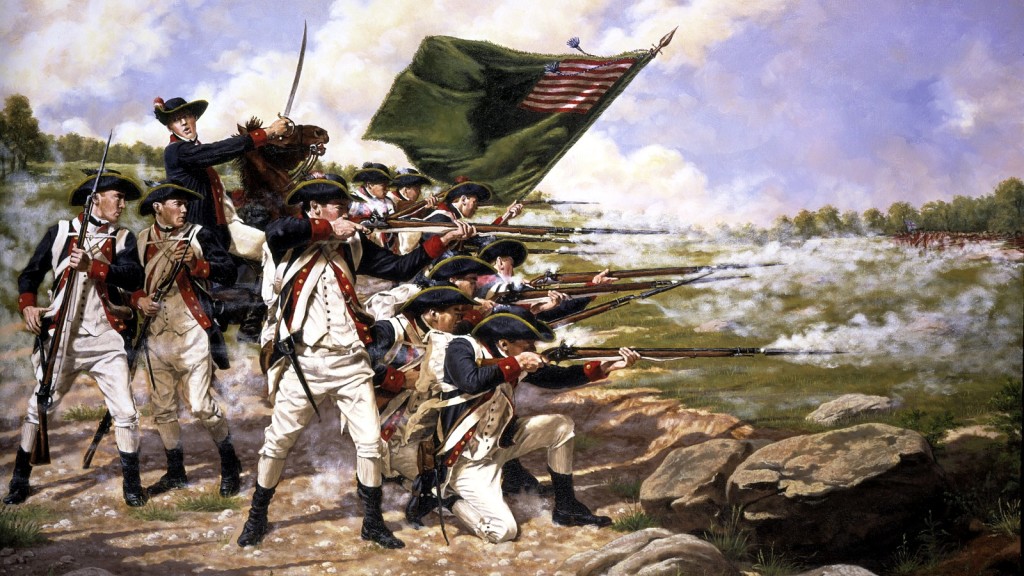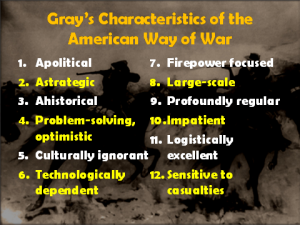The Winners: The American Way of War in 25 Words or Less

Last Friday, I announced a contest. Lay out the American Way of War in 25 words or less. We will list the 15 best and the top 3 win a WOTR flask.
Before I get to the winners, here is an answer provided by the strategist Colin Gray (special thanks to John Kuehn and D. Scott Stephenson):
Most entries were intensely pessimistic and focused on an over-reliance on technology; tenuous connections between tactics, policy and strategy; and the need for short decisive victories when such a thing may not be possible. Here are the winners:
1. David Lawson:
When life gives you conflict, drone it.
2. Jack McDonald, War Studies Department, King’s College London:
Use a sledgehammer to crack a nut. Occasionally eat a nut, occasionally hit own nuts. Everyone else is scared, horrified and awed in equal measure.
3 (tied). Hank Salmans:
Algorithmic expansion, hegemonic additionists
Political discussions, didactic attritionists
Conflicts all gambits a toss of a coin,
The penultimate threat an atomic kick to the groin.
3 (tied). Kelsey Atherton:
We go abroad in search of monsters to destroy, wearing the finest armor ever made, yet we keep finding ourselves in quicksand, swatting at flies.
The rest in no particular order:
G. Alexander Crowther:
We have become the Prussian Army – excellent fire, maneuver and logistics at the tactical level while ignoring strategy and hoping politicians don’t ask embarrassing questions.
Crispin Burke:
The American Way of War uses today’s technology to solve problems which have been around for centuries. Results tend to vary.
Charles J. Dunlap, Jr., Major General, USAF (ret.):
The American Way of War aims to equip the world’s best trained warfighters with the finest technology for missions serving both America’s interests and ideals.
Michael Dunn (25 words):
Smiting (repeat 24 times)
COL Brian Petit, submitted from Afghanistan:
The massed combination of force, technology, firepower and human capital, spirited by an evangelical belief in American ideals, in pursuit of US foreign policy goals.
Dave Maxwell, Georgetown University, WOTR Columnist:
Excellent tactics, good operational art; built on a foundation of mass, firepower, advanced technology and logistics while craving any strategy and policy to support.
Glenn Harned:
Blue-centric, uses firepower and technology vice manpower; quality over quantity; seeks to refight 1944 with better toys; disregards indigenous population; grand strategy a vacuum.
R. Jordan Prescott:
Proof that a special Providence watches over children, drunkards, and the United States.
Tom Wein:
Technology plus mass plus force protection equals victory. All change if not. Clear goals would be nice, but who are we to make demands?
COL John Collins (ret.), Warlord, WOTR Contributing Editor:
Leap before you look.
PJ Neal:
Solve problem someone else created, somewhere else. Perform better than expected. Be portrayed as performing worse than you did. Come home before everything’s finished. Repeat.
Jonathan Dowdall:
Overwhelming force and constant technological revolution, but more reticent than often assumed. Fiscally irresponsible, but it’s the economy, stupid; God Bless the Troops.
Ryan Evans is the assistant director at the Center for the National Interest and the editor-in-chief of War on the Rocks.


